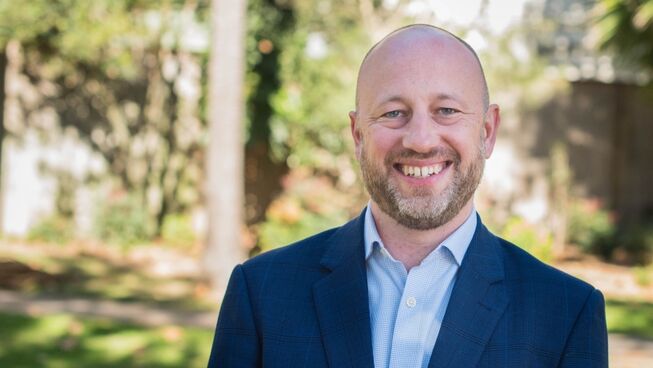Flourishing in the Furnace

Michael Bungay Stanier might not be a household name, but in the booming industry of life coaching he’s considered the guru. And while life coaches have been around for a while, according to a recent article, the industry is booming in the wake of the pandemic. But after two years of doom and gloom is that really any surprise? All of us could do with a bit of positive, Ted Lasso-style uplifting encouragement!
And while there is a lot positive to say for the industry, that recent article acknowledged that while the transformation that life coaching sells is “seductive” it is also “often elusive”. Indeed as the global guru of the industry Bungay Stanier himself admits, “No matter how awesome you are, no matter how great you are doing, life is messy and difficult”.
And yet our culture is often slow to admit this. On the contrary, we go out of our way to avoid mess and difficulty. If my aspirations aren’t being fulfilled in my current work role I’ll move on. Or if a friendship has become hard I might pull back from it for a time, until it gets easier. Or even, if my church isn’t really satisfying me anymore I might decide it’s time to look elsewhere. Our normal strategy is to try and escape difficulty, because nothing good comes out of it, certainly not flourishing.
However such a view is profoundly at odds with how the Christian faith views mess and difficulty. It consistently teaches that flourishing is found not in avoiding furnaces, but in furnaces. And when we live and work like this it forms a powerful witness to those around us, including our work colleagues.
Worldly furnaces produce eternal gold
We could find this teaching in many places in Scripture, but the opening to 1 Peter is a clear example of it. Peter begins his letter by first outlining the goal of Christian life, furnace or otherwise; that is, for us to grow in Christ-like obedience. “You have been chosen according to the foreknowledge of God the Father, through the sanctifying work of the Spirit, to be obedient to Jesus Christ and sprinkled with his blood” (1:2). God saved you by Christ’s blood for a life of obedience, empowered by His spirit.
Now God can grow our faithful obedience any way He chooses. But I would suggest that the most common way He does it is through trials, testing, and furnaces.
The late Malcolm Muggeridge, a former socialist journalist who became a Christian later in life, knew this, writing, “I can say with complete truthfulness that everything I have learned in my 75 years in this world, that has truly enhanced and enlightened my existence, has been through affliction”.
Indeed this has been my experience too, that the deepest, richest lessons that God has used to develop Christlike obedience in me have come not on the mountaintops, but in the valleys. And the Apostle Peter confirms this: “In all this you greatly rejoice, though now for a little while you may have had to suffer grief in all kinds of trials. These have come so that the proven genuineness of your faith—of greater worth than gold, which perishes even though refined by fire—may result in praise, glory and honor when Jesus Christ is revealed” (1:6-7).
The first thing we need to understand about these verses is their context. Peter begins by saying, “In this you greatly rejoice”, referring back to the Christian hope he outlined in the previous verses, namely our new birth in the past (1:3), and our future hope of a heavenly inheritance (1:4). For the Christian person, looking back and looking forward gives cause for great rejoicing now.
But without taking a breath, Peter moves “from ecstasy to agony”, from our past new birth and our future inheritance, to the present trials the people of God are facing. And not just any trials, but as Peter says, “all kinds of trials”, all that we experience which we might describe as like being in a furnace.
However the wider context of the letter brings an added layer of focus to that “all”, in particular, the trials we might face because of our new holy, obedient identity in Christ. That is, the trials we face because we’re living distinctly, differently, counter-culturally, like Jesus. For example, where we lose out in the eyes of the world - materially, experiencially - because of our obedience to Christ, or we miss workplace opportunities because we pursue service rather than selfishness, or even when we are persecuted because our obedience puts us at odds with those around us.
But why does Peter move dramatically “from ecstasy to agony” in verse 6? He answers this question immediately: “These trials have come…” (1:7). Peter gives us two examples of the eternal gold that furnaces produce and why they are an integral (and even valuable) part of the Christian life of obedience.
a) Our faithful obedience is strengthened by furnaces
Furnaces have a habit of revealing to us our frailties, vulnerabilities, and insufficiency, that is, when something is too big and difficult for us to handle ourselves. But when they reveal this they do something further, that is, revealing also where our obedience is lacking, or our faith-less-ness.
Furnaces draw out impurities in our life, giving us fresh eyes to see how we might have become proud, self-sufficient, self-righteous, and self-confident.
But God’s purpose for furnaces is much greater than simply giving us fresh eyes to see our faults. Rather, furnaces burn off those impurities. Like flames burn off the impurities in gold, so too our pride, self-dependence, and self-righteousness is burnt off as a furnace humbles us and forces us afresh upon God. The end result is we walk with a deeper, more obedient faith, with Him. As Peter says our faith is “proven genuine” by the furnace.
However, we might respond to the way God uses furnaces by asking “Isn’t the obedient faith I have presently enough? Could I not just skip the furnace bit of life and keep walking faithfully with Jesus as I currently am?” Such a view however underestimates just how eternally valuable faith is, and Peter gives an illustration to make this point. That is, our faith, which is proven genuine by furnaces, is more valuable than the most valuable earthly commodity - gold.
I spent New Years in Newcastle north of Sydney, a major mining city and port. While I was there I met a guy who has worked in the mining industry for many years and he told me a fascinating statistic about gold: one tonne of earth is removed to get just 0.5 grams of gold. Leaving aside the ethical and environmental issues this fact might raise for you, that tells me a number of things, not least that gold is still incredibly valuable. If that kind of effort is exerted for such a small amount of the product, how valuable must it be.
And yet Peter says this of your faith - it is “of greater worth than gold”. It is more precious, more valuable, more costly than gold. And logically that makes sense doesn’t it, because for you to receive faith in Christ it cost more than a tonne of soil; it cost Him His very life.
And so this is why God ordains furnaces, and why we can even gladly accept them, because they strengthen our faithful obedience which is of greater worth than gold, as they burn up our self-reliance, as we lean on God all the more, rather than throw in the towel, or seek to minimise discomfort.
b) Furnaces demonstrate our faithful obedience so Jesus is glorified
But Peter goes on to give a second and even greater example of the eternal gold that furnaces produce, namely they display our faithful obedience so that ultimately Jesus is glorified.
How is this the case?
As we make the choice to obey Christ, even when it costs us, that gets noticed by others, particularly our colleagues when we practice this in our daily work, which leads to opportunities for us to glorify Jesus.
For example, when you choose sacrifice over selfishness in your daily work, or you endure reputational, financial, or experiential loss if it means obedience, or you embrace the weak and despised rather than chase the influential the genuineness of your faith is displayed. And Peter says that Jesus will get the glory when we give the reason for the hope we have in the midst of furnaces (3:15).
God is with us in those furnaces when we feel most alone
But how can we have hope in the midst of furnaces? In addition to knowing our future inheritance, and the purpose furnaces are serving now, we also are never alone in them. God is with us.
COVID has thrown up many tragedies, and all of us have been impacted in different, and painful ways. But arguably the most horrific aspect of it has been those who have had to die with COVID alone, in a hospital bed without any loved ones in the room. Not even a nurse or doctor able to be present in that final moment with them, providing a comforting arm around their shoulder, or holding their hand, or speaking words of kindness to them. No, as author and journalist Greg Sheriden writes, “The last sight for many of the legions of the COVID dead was a heroic health worker behind heavy layers of protective gear, looking like something like a robot in an old science fiction movie”. The “COVID dead” were alone in life’s greatest furnace.
And yet this is the wonderful Christian hope, that we are never alone in the furnaces of life, because God walks with us in them. This is what He has promised: “But now this is what the LORD says…’When you walk through the fire, you will not be burned, the flames will not set you ablaze…for I am with you’” (Isaiah 43:1,2,5). Or most famously in Psalm 23:4, “Even though I walk through the valley of the shadow of death I will fear no evil…for you are with me”.
When we come to the New Testament this truth takes on even greater richness, because the God who walks in furnaces with us has Himself already been through the greatest furnace, as Christ on the cross. Although unlike us, that furnace wasn’t a purifying furnace for Him, but one on our behalf. And also unlike us, He did enter that one alone.
Three ways this enables flourishing in workplace furnaces
So practically how does this help us? Here are three suggestions.
Firstly, it gives us the right perspective to take into the furnaces of daily work. It’s important that we are alert to how we might be buying into the wisdom of our age, the Bungay Stanier school of thought, of avoiding furnaces so that we might only ever experience pleasure. Such a perspective is at odds with God’s perspective.
Who’s to say that that annoying colleague is not a crucible God is using to make you more patient and kind like His Son?
Or that challenging project is not being used by Him to grow you in perseverance? Or that junior colleague who seems to waste your time is not being used by Him to train you in self-less sacrifice? Or that awkward conversation about your faith is not being used to cultivate assurance of your identity in Christ, irrespective of how people might respond? Let’s not try and escape these things, but see them for what they are in God’s economy; furnaces that produce eternal gold.
Secondly, remember your companion. You never walk alone in these furnaces but always with the One who knows the heat of furnaces greater than we ever will. The temptation in our daily work will be to go with the flow, leave our faith at the door, especially when the path of obedience puts you at odds with your colleagues. But I have found that that path only leads to misery and greater pain in the long run. Rather, we find the strength to be counter-cultural by remembering our companion in the furnace - God Himself.
Thirdly we flourish by seeking His forgiveness when we fail. Some furnaces will inevitably get the best of us. We’ll lose our temper, or lack kindness, or act selfishly, or fall back into thinking we can do it all in our own strength. These things will happen as we await our eternal inheritance. But we flourish when we seek out His forgiveness, which He is only too willing to give, and then get back on walking with Him.
Life coaches can be helpful, but we need more than that for when life is inevitably difficult and messy. Because try as people might, you can’t get through life without going through furnaces. But we know the good that they are for us. And more than a life coach who stands on the sidelines cheering us on, we have a Saviour who walks with us in them, making us more like Him, and in so doing we demonstrate to our colleagues the wonderful difference He makes for good, so that He might be glorified.






